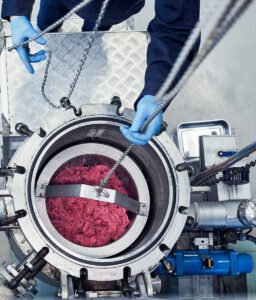The Hong Kong Research Institute of Textiles and Apparel (HKRITA) in partnership with the H&M Foundation, developed the hydrothermal separation system (The Green Machine) to manufacture garments for H&M’S brands Monki, creating its first-ever circular line made out of recycled polyester.
Jenny Fagerlin, Sustainability Director at Monki, said, “As a fashion brand we need to do our part when it comes to closing the loop. With eyes wide open, Monki will walk into this climate-decade and be part of the solution. If we can prolong the life of our products for as long as possible and decrease the usage of virgin sources, it’s a huge step in the right direction.”
 In 2020, Monki released its first collection from the Green Machine technology, created at the smaller Hong Kong system. Based on this, a more extensive pilot programme will be undertaken in 2021. It will be operated in PT Kahatex, an established textile manufacturer in Indonesia. The entire system runs on just heat, water, pressure, and a biodegradable green chemical. According to the H&M Foundation, it doesn’t create secondary pollution as it’s a closed-loop where all the elements are reused time and again. The industrial-scale Green Machine will be able to process up to 1.5 tons per day. PT Kahatex will first start using waste produced from manufacturing like difficult-to-recycle blended fibers, yarn, and fabric as feedstock to create garments.
In 2020, Monki released its first collection from the Green Machine technology, created at the smaller Hong Kong system. Based on this, a more extensive pilot programme will be undertaken in 2021. It will be operated in PT Kahatex, an established textile manufacturer in Indonesia. The entire system runs on just heat, water, pressure, and a biodegradable green chemical. According to the H&M Foundation, it doesn’t create secondary pollution as it’s a closed-loop where all the elements are reused time and again. The industrial-scale Green Machine will be able to process up to 1.5 tons per day. PT Kahatex will first start using waste produced from manufacturing like difficult-to-recycle blended fibers, yarn, and fabric as feedstock to create garments.
Edwin Keh, Chief Executive Officer of HKRITA, mentioned how the new normal had driven us in a green direction. “In collaboration with our partners in the supply chain, we have created a system that at scale will achieve two very important aims: first, it will provide a new and commercially viable industrial recycling solution and second, it will help us move closer to a sustainable future.”
H&M has been working hard on sustainability to fight their fast fashion reputation, with a range of measures implemented to advance circularity, For instance, as part of its Bottle2Fashion project, H&M recently collaborated with Danone Aqua and transformed plastic bottle waste from the shores of Indonesia into recycled polyester, the same material used for its latest kidswear collection.



